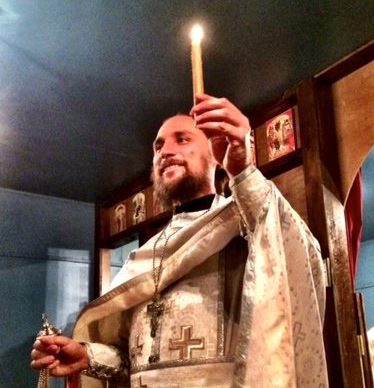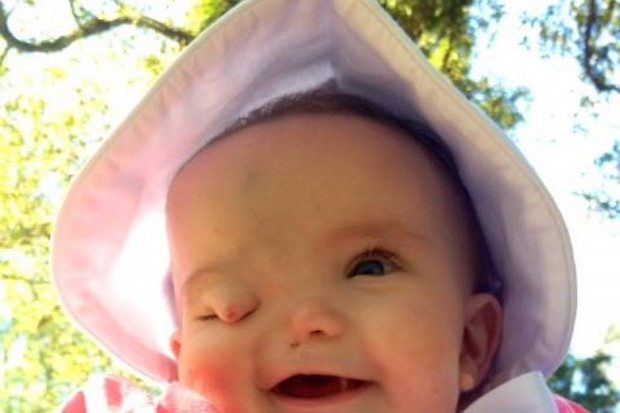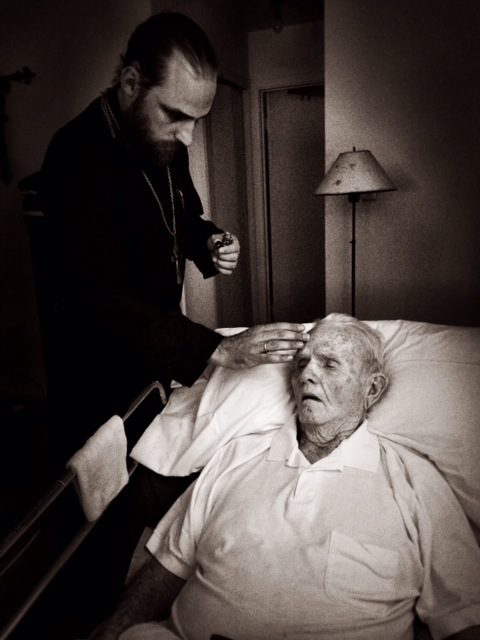The Mission of The Mission
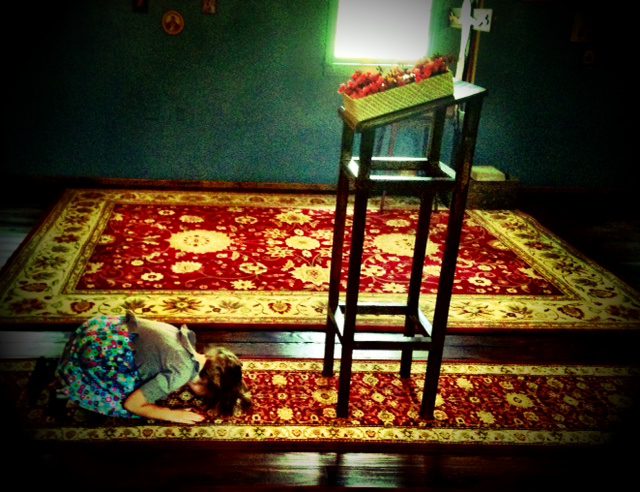
This is a post I had hoped never to have to write.
Our little Orthodox mission in West Feliciana, St. John the Theologian, is losing our priest after three and a half years, though it won’t officially close. Father Matthew Harrington and his family are returning home to Washington state. There are no plans to replace him. We can’t afford it. We have fewer members now than we did when we started. It was always going to be a long shot to establish Orthodox Christianity in a small Southern town, and it hasn’t happened. Yet, anyway. We don’t know what God has in mind.
It all happened quite suddenly, and out of the blue. Early last week, one of the church’s families, converts of three years, met with Father Matthew and told him that they were leaving Orthodoxy. Just like that. We had an emergency meeting of the congregation after liturgy this past Sunday to consider our options. But there really were no options to consider. We are down to three families (not counting the Harringtons) and a monk. Father Matthew was already making do on a pittance wage, but we were paying him the most that we could. The departing family promised to continue their tithe through year’s end, but that would be simply delaying the inevitable, Father Matthew figured. (I think he’s right.)
The Harringtons have been through so much since they’ve been here. Anna nearly died last summer giving birth to Irene, who has severe birth defects. Anna required 31 units of blood during the surgery. The human body contains between 10 and 11 units, meaning she bled out entirely nearly three times. Almost nobody survives that. But Anna lived, and so did that sweet baby! It was a miracle of God, said the doctors. Here is what Irene looks like today:
The Harringtons have been a clergy family in a minuscule mission parish. They had nothing. Perfect strangers — including many readers of this blog — opened their hearts and donated to a GoFundMe to help them pay for Irene’s care, which will be unending. In the past 11 months, you have given over $87,000. I can assure you that every single penny of that money has been scrupulously dedicated by the Harringtons to Irene’s care, and nothing but. Writing this, tears come to my eyes, thinking about how kind you all have been to that family, and that precious child.
Not many people know this, but the Harringtons learned from medical testing early on that Irene would have all these critical problems. She was unlikely to survive until birth, they said. And if she did, Anna stood a good chance of dying in the process. If ever there were a good case for termination, it was this one. But they said no. We are Christians, they said, and we welcome life, and whatever God sends.
He sent Irene, and he sent skilled doctors and nurses who saved her and saved her mother’s life. And he sent you all, with generous hearts, to help carry the financial burden. Thank you.
Over the last three and a half years, we have lost some people —
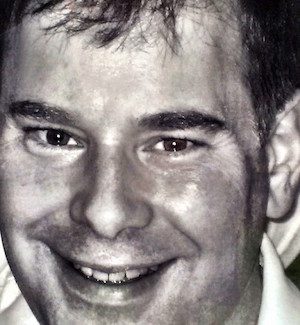
original members and converts — to attrition. Orthodoxy is not an easy way of life. We gained a couple of dear converts who remain with us. But most grievously, we lost our beloved Jack Cutrer. His mother found him dead in his home on his sofa one morning. His prayer rope was in his hand. He passed away in prayer. He had been in and out of the hospital with kidney trouble, but he was sicker than he knew, sicker than any of us knew. He was only 41 years old. To say his passing was a shock is a gross understatement. Jack was there from the beginning. He read himself into the Orthodox Church years before we had a mission here. Jack was quiet and steady. We loved him more than we can say. I pass by his grave in the Starhill Cemetery almost every day, and think of him.
I grieve to think of what has become of Jack’s dream. I know I’m not the only one. There just aren’t enough of us to support a priest at this point. It was mostly a matter of money, but even if the heavens opened and rained dollars, that doesn’t change the blunt fact that we are so few. “We’re going to start coming to your church,” people said, and “What a great parish! We’re going to try to move to St. Francisville and join you.” If only half the people who told us these things had followed through, things might have turned out otherwise. But they didn’t, and they didn’t. There’s no changing the past.
The Lord giveth, and the Lord taketh away. Blessed be the name of the Lord.
Father Matthew taught us always to say, “Glory to God,” no matter what. So let me say a little about why I can say that through tears. In my book How Dante Can Save Your Life, I told his personal story, and how he helped lead me through the worst spiritual, emotional, and physical crisis of my life. Here, in a short passage from the book, is an example of his leadership:
After vespers one warm October night, I took my spiteful passions to Father Matthew in confession.
“I know my anger is wrong, and that’s why I’m in confession,” I said. “I realized, reading Dante this week, that I resented all of them for being happy without us. I know it’s not right, but I can’t get out from under this anger.”
I explained that I felt like I was living the prodigal son parable, but in this telling, the father is not running out to welcome the long-lost son but rather taking the side of the bitter older brother and not letting the younger one come through the gate.
“That’s tough,” Father Matthew said. “So what do you want?”
“I want justice. It’s not fair, the way they do me.”
“You want justice?” he said, chuckling. “What is justice? You have no right to expect justice. It’s nice if you get it, but if you don’t, that doesn’t release you from the commandment to love. The elder brother in the prodigal son story stood on justice, but his father stood on love.”
“Okay, but I think that if I do that, they’re going to win.”
“Win? This is a contest, Benedict?” he said. [Benedict is my chrismation name — RD] “I don’t know about you, but from where I sit, it doesn’t look to me like you’re winning much of anything by hanging on to all of this.”
He was right. I was wrong. In large part because of that priest, I was able to be at my dying father’s bedside the last week of his life, and to hold his hand when he passed away, and to be something I had never been in my life: at peace with God and my father.
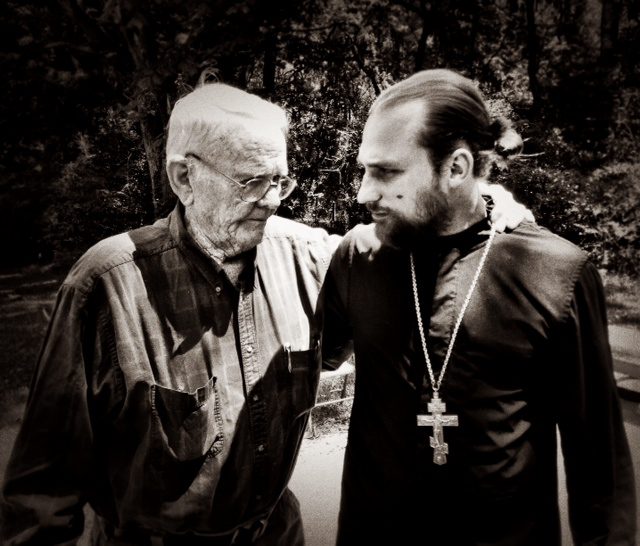
Daddy thought the world of Father Matthew. “That’s a good man,” he told me. And there was Father Matthew, anointing my father on his deathbed, days before he entered eternity:
When Father Matthew arrived in this subtropical sauna from the Pacific Northwest, we tried to school him in Southern manners. He told us firmly, “I’m not here to be your friend. I’m here to be your priest.” Which was a little bit shocking to us, but it turned out that he was right to say that. Were I a priest, I could not have said the hard things he said to me many times in confession — things I needed to hear, and things it would have been hard for a chummier priest to say. I love priests, and make friends easily with them. Not Father Matthew. It wasn’t that he was unfriendly, not at all. But he took his role as spiritual father very seriously, which made him immune to the usual hail-fellow-well-met ways of us Southerners.
And this made him a very effective priest. Best I’ve ever had, and likely ever will have. The thing is, he isn’t soft and intellectual, like me. Don’t get me wrong, he’s very intelligent and well read. But dispositionally, he’s not an intellectual, and that makes all the difference. When I was so sick, and struggling to make sense of the terrible emotional tangle of my family’s life, and the pain and confusion between my dad and me, Father Matthew cut straight through all the rationalizations that kept me from seeing myself as I really was. As I’ve said, Dante was the leader, but I could not have been set free were it not for the help of my therapist Mike Holmes, and Father Matthew. It was he who gave me the epic prayer rule that got me out of the prison inside my head. It was he who refused to let me feel sorry for myself.
He did not comfort; he led. And for that, I will be forever grateful.
I had been Orthodox for six years when the Harringtons arrived. I loved being Orthodox, but there had been no stability in it. We moved a lot in that time, and I had allowed myself to get caught up in church politics, which was stupid and self-destructive.
Father Matthew fixed that.
He is a priest of the Russian Orthodox Church Outside Russia (ROCOR), the exile church continuing after the Bolshevik Revolution. ROCOR was fully reconciled with the Moscow Patriarchate a few years ago, but in the diaspora, ROCOR kept all the Russian traditions. We didn’t seek out a ROCOR priest for our mission — all of us were members of the Orthodox Church in America — but ROCOR was willing to send us one, so we became a ROCOR mission. That meant celebrating Christmas in January, because ROCOR follows the Old Calendar. And it meant that if we wanted to receive Communion on Sundays and feast days, we would have to come to vespers the night before.
“But no other Orthodox church does that!” we protested.
“We do,” he replied, meaning ROCOR. “It’s not negotiable.”
Boy, did we grumble, me loudest of all. What business does the church have demanding that I come to evening prayer between 6 and 6:45 every Saturday night if I want to receive Communion the next day? We have dinner parties, crawfish boils, football games to go to. We’re going to be late!
Sorry, it wasn’t negotiable.
So I did it. We all did. And in time, I came to love the vespers service. Saturday didn’t feel right without it. Father Matthew was not a hard taskmaster — he challenged me constantly, but never gave me more than I could handle. Though a convert himself, he didn’t have time for the usual American Christian, forgive me, bullshit. What a rare gift that is in a priest. His stance was basically this: Either God is God, or He isn’t. If He is God, then everything in your life must be ordered to Him. Orthodoxy is not a Sunday-only kind of faith. You have to be all in. Because God is God, and we are His people.
Your Working Boy talks a good game about the value of orthodoxy, and of Orthodoxy, but he did not know how much of it was just talk until he fell into the clutches of Father Matthew Harrington, who did not have much patience for self-deception and spiritual laziness. He’s a former cop. He grew up in difficult circumstances, raised by his grandparents. He knew the stakes, morally and spiritually, in all our lives. And he loved us all too much to let us fail.
Boy, can that man preach. He hated it when I would praise him for his homilies, but I have never heard a better preacher (and I have heard many of them in my lifetime). He made you want to be better, to repent more deeply, to love more completely, to pray with more intensity. His homilies were often not about any specific thing, but they were about everything, and not in a general, hodge-podge way. I’ve thought a lot about his rhetoric, and have been mystified as to why he was such an effective preacher, even though he didn’t write his sermons as if they were op-eds. The answer, I think, is that he did not usually tell us what to think as Orthodox Christians, but he taught us how to think as Orthodox Christians. Big difference.
It is a tragedy, a real injustice, that Father Matthew will leave us soon and return to Washington state, and will cease to work as a priest for now. He’s not leaving the priesthood, thank God, but there are no parishes open for him in our very small and poor national church. Wherever he lands for employment, the people he will be working with will not know that they have one of the most gifted young priests in America in the next cubicle over. This is wrong, this is cosmically wrong … but there’s nothing to be done about it.
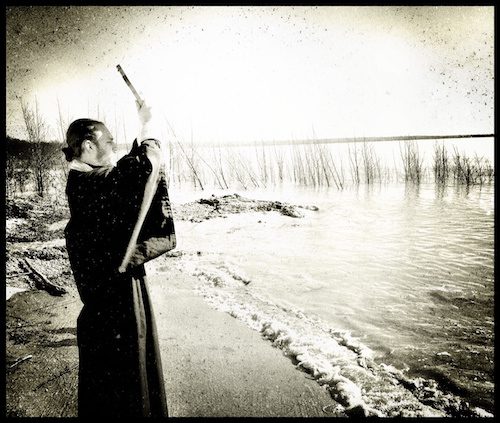
Many tears have been shed this past week as the reality of our situation has sunk in. Julie and I were talking the other night about how hard these last three and a half years of mission life have been, but how much we have grown in them. In a mission as small as ours, it was all hands on deck. Me, my habit has always been to hang back, to brood, to analyze. I couldn’t get away with that here. There was nowhere to hide. And it was good! I have grown more spiritually these last three years than I have the previous twenty, at least. It has all been grace, at times a severe mercy. But a mercy all the same.
As you know if you read The Little Way of Ruthie Leming, or my Dante book, I returned to my hometown with the best of intentions after my sister passed, but was devastated to discover a hidden family secret that changed everything. The inability to overcome old grudges sedimented into the family’s bones nearly destroyed me spiritually and physically (my chronic mononucleosis was caused by deep and abiding stress, doctors said). Thanks in large part to Father Matthew’s leadership, and the simple practice of the Orthodox life, day in and day out, as I learned in our mission, I was given the grace, the clarity, and the strength to identify, confront, and throw down the false idols of Family and Place, and finally, after four decades, begin to re-order my life around God the Father.
Reflecting on what St. John’s has meant to me, I cannot improve on the words of Dante: “Incipit vita nova: Here begins the new life.”
The most important lesson I learned from these blessed three years at St. John’s is that nothing, absolutely nothing, must come before God. There is no doubt in my mind that I could not write the Benedict Option book if it had not been for what God did for me at St. John’s. Julie and I agree that we cannot live and raise our kids without close involvement with an Orthodox parish, and the sacraments. And the education of our children — their moral, intellectual, and spiritual formation as Christians — is inseparable from the life of the Church.
That is why we have had to make the hard, hard decision to move this summer just down the road to Baton Rouge. Before we had the mission, we would drive 45 minutes each way on Sundays to the Orthodox mission there. We were glad to have the Baton Rouge church, but it’s hard to be a real part of a parish’s life if you’re so far away.
Before we received the shock about St. John’s last week, we had enrolled all three of our kids in Sequitur Classical Academy in Baton Rouge. My son Matthew was in Sequitur for its first two years, but then withdrew because of his own particular needs. Now he’s returning for his 11th grade year, and he’s bringing his brother and sister with him. The school is really growing, and we want to give everything we have to building it up. Julie has been working for months with our friends who lead Sequitur, and has been planning to open in Fall 2017 a sister school in St. Francisville. Father Matthew was key to that plan. Without Father Matthew, a classical Christian school in St. Francisville becomes untenable. We had planned to take the hit of driving 90 minutes round-trip to Baton Rouge four days a week so the kids could have a year of Sequitur before opening our local school. Now we not only wouldn’t have a local classical Christian school to look forward to, but we would also have had to add another day of 90-minutes driving, this time on Sunday. It made no sense.
Nothing about this — about any of it — is what we expected, or what we wanted. But Father Matthew has formed us all well to be resilient.This isn’t the end of the world. As much as we hate to leave St. Francisville, God must come first. Happily, it’s only 45 minutes away, and an easy drive to get back to the West Feliciana hills. Don’t worry, I’m still going to be all up in the Walker Percy Weekend. My mom is in good health, and well looked after by her friends and neighbors. She doesn’t want to see us go either, but she tells me it makes sense. Besides, it’s not far.
To be honest, if I had not been doing so much research about the Benedict Option this year, and had not become even more convinced about the critical importance of having a strong parish and school for one’s kids, it would have been harder to make this decision. But there really can’t be a compromise on this. I’m convinced of that. How strange and unsettling that circumstances are sending us into the city for the Benedict Option. But I’ve always maintained that the Ben Op is not about heading for the hills and nothing but. Most people will live out the Ben Op in cities and suburbs, because that’s where we are.
To repeat: St. John’s mission will not be closing down, I’m happy to say. There will be a remnant, and they will gather there for typika and other prayers on Sundays and feast days, and will have liturgy when a priest is passing through and able to serve. We all worked too hard to build that church for them to let it go. We will help as we can. They are our family, and some of the finest people we have ever known. And we are renting our Starhill house out, not selling it. We want to come back. But now is not the time. It breaks our heart, God knows, but you can’t sustain a parish on heartbreak.
Some of you readers came through town over these last several years, and worshiped with us at St. John’s. I’ve been so encouraged by your sincere praise of what we had there, in our community and especially in our priest. You saw it. You had a glimpse of what Orthodox parish life can be like, despite our poverty and despite our strangeness here in the rural South. If only you could have seen what we had week in and week out! Well, I did see it, and I will carry those memories for all my days. It was a theophany, all of it, even the struggles. And it changed my life.
Father Matthew arrived here as a newly ordained priest, and he leaves here a real Father. He said he came to be our priest, not our friend, but in truth, he became one of the best friends we ever had. And that is something nobody can take away from us.
